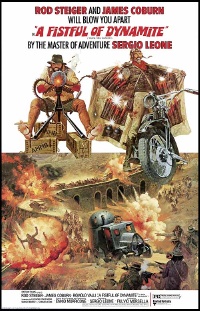 Though I’ve always been hesitant about it due to it’s name, I watched Duck, You Sucker! A title, which while silly, is still better then the far too banal title that it was also released under, A Fistful of Dynamite. This is Leone’s movie immediately following Once Upon a Time in the West, which makes it a run of 5 straight classic westerns for him. Taking place in Mexico during the time of the Mexican Revolution the story starts off with the entertaining robbery of some rude richies riding about in the fanciest stagecoach I’ve ever seen. They are robbed by a family, literally, of bandits. After the robbery, the bandits set of towards some mysterious explosions in the distance and their futures take a dramatic change in direction. See, this bandit family is led by Juan, who has a dream of robbing the bank in Mesa Verde. When they get to those explosions, they encounter John, an IRA explosives guy on the run, who claims to be prospecting for silver. John has no interest in even acknowledging them, but Juan see the explosions, thinks of the bank and gets an idea. They team up, sort of, and it is the story of their travels as they go from somewhat reluctant and hostile partners together in pursuit of robbing a bank, to being close friends tightly in the midst of Revolution!
Though I’ve always been hesitant about it due to it’s name, I watched Duck, You Sucker! A title, which while silly, is still better then the far too banal title that it was also released under, A Fistful of Dynamite. This is Leone’s movie immediately following Once Upon a Time in the West, which makes it a run of 5 straight classic westerns for him. Taking place in Mexico during the time of the Mexican Revolution the story starts off with the entertaining robbery of some rude richies riding about in the fanciest stagecoach I’ve ever seen. They are robbed by a family, literally, of bandits. After the robbery, the bandits set of towards some mysterious explosions in the distance and their futures take a dramatic change in direction. See, this bandit family is led by Juan, who has a dream of robbing the bank in Mesa Verde. When they get to those explosions, they encounter John, an IRA explosives guy on the run, who claims to be prospecting for silver. John has no interest in even acknowledging them, but Juan see the explosions, thinks of the bank and gets an idea. They team up, sort of, and it is the story of their travels as they go from somewhat reluctant and hostile partners together in pursuit of robbing a bank, to being close friends tightly in the midst of Revolution!
Rod Steiger is quite good as Juan, as he fills his role with great muster and enthusiasm (including a rather entertaining accent) which makes it convincing, despite the ethnicity issues. John is played with his usual fine charisma by James Coburn, though his Irish accent can’t help but lead to some frequent grimacing and eyebrow raising. Their relationship is the core of the film, with only a handful of other characters with any substance, and its a good one. There is some nice dialogue (though I could do without hearing anyone utter the title) and it is an impressive production. Though Duck, You Sucker! does have a lot of the serious feel of the his previous westerns, it is also a somewhat more comedic matter, not as bad as the level to which the Italian western was descending, but it is certainly a more melodramatic film than the earlier ones.
Even with its elevated emotive content, and at times it does get a bit artsy, with flashbacks galore (done in a soothing 1970’s French film style of foggy-lensed, slow motion emotion), it is still a serious film, with some serious subject matter. The revolution is shown clearly, with the mixed agendas of the revolutionaries, and the fascistic ways and stylings of the government. There are firing squads, evil military commanders and back-stabbing traitors all shown in a very serious manner. And, I must add, it has another one of those great Morricone soundtracks.
